 ONIBABA (Masters of Cinema) (Blu-ray) | Blu Ray | (25/02/2013)
from £13.35
| Saving you £6.64 (49.74%)
| RRP
ONIBABA (Masters of Cinema) (Blu-ray) | Blu Ray | (25/02/2013)
from £13.35
| Saving you £6.64 (49.74%)
| RRP Kaneto Shindo, one of Japan's most prolific directors, received his biggest international success with the release of Onibaba (The Demoness) in 1964. Its depiction of violence and graphic sexuality was unprecedented at the time of release. Shindo managed - through his own production company Kindai Eiga Kyokai - to bypass the strict, self-regulated Japanese film industry and pave the way for such films as Yasuzo Masumura's Mojuu (1969) and Nagisa Oshima's In the Realm of the Senses (1976). Onibaba (or Onibabaa, in its alternate spelling) is set during a brutal period in history, a Japan ravaged by civil war between rivaling shogunates. Weary from combat, samurai are drawn towards the seven-foot high susuki grass fields to hide and rest themselves, whereupon they are ambushed and murdered by a ruthless mother (Nobuko Otowa) and daughter-in-law (Jitsuko Yoshimura) team. The women throw the samurai bodies into a pit, and barter their armour and weapons for food. When Hachi (Kei Sato), a neighbour returning from the wars, brings bad news, he threatens the women's partnership. Erotically charged and steeped in the symbolism and superstition of its Buddhist and Shinto roots, Kaneto Shindo's Onibaba is in part a modern parable on consumerism, a study of the destructiveness of sexual desire and - filmed within a claustrophobic sea of grass - one of the most striking and unique films of Japan's last half-century, winning Kiyomi Kuroda the Blue Ribbon Award for Cinematography in 1965. The memorably frenetic drumming soundtrack was scored by long-time Shindo collaborator Hikaru Hayashi. The Masters of Cinema Series is proud to present Onibaba for the first time on Blu-ray in the UK. Special Features: Gorgeous New 1080p HD Transfer Full-length Director's Audio Commentary by Director Kaneto Shindo and the Stars of the Film, Kei Sato, and Jitsuko Yoshimura Video Introduction by Alex Cox 8mm Footage (40-minutes) Shot on Location by Lead Actor Kei Sato Optional English Subtitles Original Theatrical Trailer Production Stills and Promotional Art Gallery 36-Page Booklet with a New Essay by Doug Cummings - An English translation of the original short Buddhist fable that inspired the film and a statement from Writer/Director Kaneto Shindo about why he made Onibaba
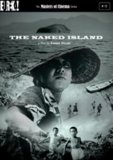 The Naked Island (Masters of Cinema) (1960) | DVD | (20/06/2005)
from £N/A
| Saving you £N/A (N/A%)
| RRP
The Naked Island (Masters of Cinema) (1960) | DVD | (20/06/2005)
from £N/A
| Saving you £N/A (N/A%)
| RRP Kaneto Shindo's Naked Island tells the story of a small family unit and their subsistence as the only inhabitants of an arid sun-baked island. Daily chores captured as a series of cyclical events result in a hypnotising moving and beautiful film harkening back to the silent era. With hardly any dialogue Shindo combines the stark 'Scope' cinematography of Kiyoshi Kuroda with the memorable score of his constant collaborator Hikaru Hayashi to make a unique cinematic document. Fil
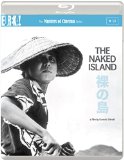 NAKED ISLAND, The (Masters of Cinema) (BLU-RAY) | Blu Ray | (24/06/2013)
from £N/A
| Saving you £N/A (N/A%)
| RRP
NAKED ISLAND, The (Masters of Cinema) (BLU-RAY) | Blu Ray | (24/06/2013)
from £N/A
| Saving you £N/A (N/A%)
| RRP Filmed on the virtually deserted Setonaikai archipelago in south-west Japan The Naked Island [Hadaka no shima] was made - in the words of its director - as a 'cinematic poem' to try and capture the life of human beings struggling like ants against the forces of nature. Kaneto Shindô (Onibaba Kuroneko) made the film with his own production company Kindaï Eiga Kyôkai who were facing financial ruin at the time. Using one-tenth of the average budget Shindô took one last impassioned risk to make this film. With his small crew they relocated to an inn on the island of Mihari where for two months in early 1960 they would make what they considered to be their last film. The Naked Island tells the story of a small family unit and their subsistence as the only inhabitants of an arid sun-baked island. Daily chores captured as a series of cyclical events result in a hypnotising moving and beautiful film harkening back to the silent era. With hardly any dialogue Shindô combines the stark 'Scope cinematography of Kiyoshi Kuroda with the memorable score of his constant collaborator Hikaru Hayashi to make a unique cinematic document. Shindô who had worked with both Kenji Mizoguchi and Kon Ichikawa shot to international fame in 1952 with the astounding Children of Hiroshima. Eight years later the BAFTA-nominated The Naked Island won the Grand Prix at the Moscow International Film Festival (where Luchino Visconti was a jury member). It is now considered to be one of Shindô’s major works and its success saved his film company from bankruptcy. The Masters of Cinema Series is proud to release The Naked Island for the first time on Blu-ray in the UK. Special Features: Newly restored 1080p transfer in its 2.35:1 original aspect ratio Full-length audio commentary by director Kaneto Shindô and composer Hikaru Hayashi Video introduction by Alex Cox Optional English subtitles 24-page booklet with an essay by Acquarello and a reprint of Joan Mellen’s interview with Shindô from Voices from the Japanese Cinema
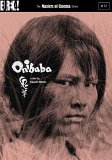 Onibaba | DVD | (22/08/2005)
from £N/A
| Saving you £N/A (N/A%)
| RRP
Onibaba | DVD | (22/08/2005)
from £N/A
| Saving you £N/A (N/A%)
| RRP Deep within the wind-swept marshes of war-torn medieval Japan an impoverished mother and her daughter-in-law eke out a lonely desperate existence. Forced to murder lost Samurai and sell their belongings for grain they dump the corpses down a deep dark hole and live off the meagre spoils. When a bedraggled neighbour the former friend of the woman's son returns from the skirmishes lust jealousy and rage threaten to destroy the trio's tenuous existence before an ominous ill-g
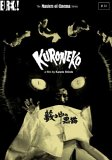 Kuroneko | DVD | (20/08/2005)
from £26.98
| Saving you £-6.99 (N/A%)
| RRP
Kuroneko | DVD | (20/08/2005)
from £26.98
| Saving you £-6.99 (N/A%)
| RRP A companion piece to his 1964 classic 'Onibaba' this is another stylish ghostly folk tale from Kaneto Shindo shot in dreamy black and white Tohoscope with another eerily menacing score from Hikaru Hayashi. Delving beyond the superficial Shindo once again examines class conflict as the arrogant Samurai elite rape and murder a woman and her daughter-in-law only to find that as shape-shifting demons the wronged peasant women will exact a terrifying revenge...
![Late Mizoguchi - Eight Films 1951-1956 [Masters of Cinema] [DVD]](/pictures/1105743.jpg) Late Mizoguchi - Eight Films 1951-1956 | DVD | (24/01/2011)
from £N/A
| Saving you £N/A (N/A%)
| RRP
Late Mizoguchi - Eight Films 1951-1956 | DVD | (24/01/2011)
from £N/A
| Saving you £N/A (N/A%)
| RRP Kenji Mizoguchi looms over the history not only of Japanese cinema - but of world cinema altogether. These eight films from the last decade of Mizoguchi's career represent a collection of eight of his greatest works which is to say eight of the greatest films ever made. Oy-sama (1951) is an adaptation of Tanizaki Jun'ichir: a poignant tale of two sisters and their ill-fated relationship with the same man: a tale of the social mores and affairs of the heart that might destroy siblings. Ugetsu monogatari (1953) a ghost-tale par excellence and one of the most highly acclaimed works of the cinema is an intensely poetic sublimely lyrical tragedy of men lured away from their wives which consistently features on polls of the best films ever made. Gion-bayashi (1953) is a drama set in the world of the geisha a subtle masterwork that yields myriad insights into the lives of Japan's service-class in the early '50s. Sansh-day (1954) recounts an unforgettably sad story of the 11th century involving kidnapping and indentured servitude - and figures again with its exquisite tone and purity of emotion as one of the most critically revered films of any era. Uwasa no onna (1954) another Mizoguchi picture set in a modern geisha house pits mother against daughter with the ensuing drama forcing both to confront their attitudes toward family and business in what is one of the filmmaker's most astute filmic examinations of oppressed femininity. Chikamatsu monogatari (1954) the tragic story of a forbidden love affair between a merchant's wife and her husband's employee was hailed by the legendary Akira Kurosawa as a great masterpiece that could only have been made by Mizoguchi. Ykihi (1955) recounts an 8th-century Chinese story of a widowed emperor and his imperial concubine filmed in sumptuous hallucinatory Agfa-stock colour. Akasen-chitai (1956) aka Street of Shame is Mizoguchi's final masterpiece and one of the greatest last films ever made depicting the goings-on in a Tokyo brothel carrying the name Dreamland where dreams are nevertheless shattered beneath the weight of financial necessity and all questions of conscience - a last testament which inspired the great French critic Jean Douchet to proclaim: For me along with Chaplin's Monsieur Verdoux and Renoir's La Rgle du jeu the greatest film in the history of the cinema.
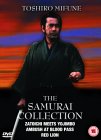 The Samurai Collection | DVD | (29/03/2004)
from £N/A
| Saving you £N/A (N/A%)
| RRP
The Samurai Collection | DVD | (29/03/2004)
from £N/A
| Saving you £N/A (N/A%)
| RRP Three features: 'Red Lion' 'Ambush At Blood Pass' and 'Zatoichi Meets Yojimbo'. Red Lion: With the winds of change sweeping through Japan overthrowing three centuries of Shogunate rule Gonzo (Toshiro Mifune) a peasant enlists in the Imperial Restoration Force which promises to reform the oppression of the past. Gonzo persuades his commander to lend him his Red Lion Mane a symbol of authority and rides into his old home town where he receives a hero's welcome. This tale both touching and hilarious traces the difficulties of a simple boastful humane man caught in the web of political intrigue. Casting a cold eye on politicians of all hues at its climax it achieves true tragic intensity. Ambush At Blood Pass: Yojimbo a ronin (Mifune) is secretly commissioned to travel to Sanshu Pass. This once crucial thoroughfare in the time of the warlords is now just a backroad used by outcasts. There he is to wait until an undisclosed event occurs. On his journey he rescues a woman from her violent husband and takes her away with him. They arrive at an inn run by an old man and his granddaughter. This place has become home to a bunch of misfits including a one-time physician (Katsu) a wandering gambler and an officer of the law together with his prisoner. A dramatic chain of events unfolds forcing the once hostile and untrusting characters to unite in a common cause: their own survival. Zatoichi Meets Yojimbo: The gentle breeze the murmur of a babbling brook the scent of plums. These memories call Zatoichi the blind swordsman back to a once-loved village. But memories are deceptive and he arrives to find things much changed. The former boss Hyoroku has been reduced to a carver of statues of Jizo the Buddha of Healing and his daughter Umeno has become a hostess and as she describes herself one of the bad ones. Control of the village is split between a former travelling merchant Eboshiya and his son Masagoro. Eboshiya befriends Zatoichi and seeks his aid against Masagoro's minder the drunken samurai Yojimbo the crooked crook. When a masseur is killed amidst rumours that a large amount of gold has been secreted in the village the two factions begin to size each other up. It is at this point that Masagoro's younger son suddenly decides his father needs more protection and calls on the services of the contract killer Kuzuryu.
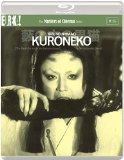 KURONEKO (Masters of Cinema) (BLU-RAY) | Blu Ray | (24/06/2013)
from £N/A
| Saving you £N/A (N/A%)
| RRP
KURONEKO (Masters of Cinema) (BLU-RAY) | Blu Ray | (24/06/2013)
from £N/A
| Saving you £N/A (N/A%)
| RRP Shindo's stylish black-and-white ghost story forms a companion piece to his earlier film Onibaba. Once again we have a woman and her daughter-in-law preying on a lone samurai. But the mood here is a little gentler and more poignant than we are accustomed to. The two women are victims of a brutal gang of samurai: they are raped and killed and fire is set to their hut. But when their cat licks the blood from their corpses, they are transformed into shape-shifting demons that favour the form of black cats. Waylaying benighted warriors, they wreak their revenge. A champion samurai is sent against them, but he finds the monsters he's hired to destroy are his own wife and mother. Shindo skilfully builds an atmosphere of eerie menace--draperies waving in the wind, Hikaru Hiyashi's score mimicking the desolate caterwauls that precede each killing. Shindo, faithful as ever to his left-wing principles, includes a strong measure of barbed social comment in his portrayal of the arrogant samurai class. --Philip Kemp
![Ugetsu Monogatari / Oyu-Sama (Masters Of Cinema) [1951]](/pictures/1081009.jpg) Ugetsu Monogatari / Oyu-Sama (Masters Of Cinema) | DVD | (21/04/2008)
from £N/A
| Saving you £N/A (N/A%)
| RRP
Ugetsu Monogatari / Oyu-Sama (Masters Of Cinema) | DVD | (21/04/2008)
from £N/A
| Saving you £N/A (N/A%)
| RRP Ugetsu Monogatar: Mizoguchi's Ugetsu Monogatari [Tales of the Rain and Moon] is a highly acclaimed masterwork of Japanese cinema. Based on a pair of 18th century ghost stories by Ueda Akinari. Amidst the pandemonium of civil war potter Genjuro (Mori Masayuki) and samurai-aspirant Tobei (Ozawa Sakae) set out with their wives in search of wealth and military glory respectively. Two parallel tales ensue when the men are lured from their wives: Genjuro by the ghostly charm of Lady Wakasa (Kyo Machiko); Tobei by the dream of military glory. Famed for its meticulously orchestrated long takes and its subtle blending of realistic period reconstruction and lyrical supernaturalism Ugetsu Monogatari is an intensely poetic tragedy that consistently features on polls of the best films ever made. Oyu-Sama:Another literary adaptation - this time of a story by one of Japan's modern literary masters novelist Tanizaki Jun'ichiro - Mizoguchi's Oyu-sama [Miss Oyu] is a poignant and contemplative tale of two sisters and their ill-fated relationship with the same man. At the core is Mizoguchi-regular Tanaka Kinuyo (who also stars in Ugetsu Monogatari) as the eponymous Oyu the older sister who allows marital customs to dictate the lives of those caught up in this complex love triangle. Continuing the director's fascination with the relationship between affairs of the heart and the social mores that shape and sometimes destroy them Mizoguchi transforms his subject matter into the realm of the transcendental through the use of long mobile shots - an approach that reaches its apotheosis in a take of almost six minutes - infused with humanity and emotion.
![Red Lion [1969]](/pictures/1003937.jpg) Red Lion | DVD | (18/06/2001)
from £N/A
| Saving you £N/A (N/A%)
| RRP
Red Lion | DVD | (18/06/2001)
from £N/A
| Saving you £N/A (N/A%)
| RRP With the winds of change sweeping through Japan overthrowing three centuries of Shogunate rule Gonzo (Toshiro Mifune) a peasant enlists in the Imperial Restoration Force which promises to reform the oppression of the past. Gonzo persuades his commander to lend him his Red Lion Mane a symbol of authority and rides into his old home town where he receives a hero's welcome. This tale both touching and hilarious traces the difficulties of a simple boastful humane man caught in the web of political intrigue. Casting a cold eye on politicians of all hues at its climax it achieves true tragic intensity.

Please wait. Loading...
This site uses cookies.
More details in our privacy policy